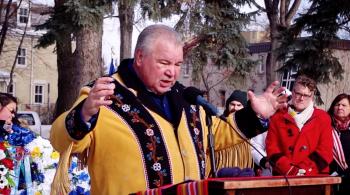Image Caption
Summary
In Canada, there is still much to be recognized in the history books, and even more to teach openly in the classrooms at all levels. Such is the case with the history of leader Louis Riel, who for many people throughout their school years was described as a “rebel” against a very young Canadian government led by Sir John A. MacDonald.
There were a lot of facts left out of those lessons, as many people heard by attending the annual Louis Riel Commemoration Ceremony held Nov. 16 at St. Boniface cemetery in Winnipeg.
The event commemorated the day Canada hanged Riel for treason.
“Louis Riel was Manitoba’s first premier,” said MaryAnn Mihychiuk, member of Parliament for the Kildonan-St. Paul riding in Manitoba. “He was a Father of Confederation, and Canada should recognize his vision…
“Today is a solemn day to know that John A. MacDonald and central Canada, or those in charge, hung a man for having such an open-minded vision of Canada. They were threatened, and they actually assassinated him.”
Riel had won a seat in Canada’s government, but was never allowed to sit. Instead a bounty was placed on his head.
“It’s an injustice, and it’s a solemn day where we recognize that Canada did the wrong thing,” said Mihychuk.
“Riel fought for minority rights” said David Chartrand, president of the Manitoba Metis Federation.
“People try to say it was only about the Metis. It was not. It was about Western Canada.”
It was a small population. “Canada was over there,” Chartrand said, motioning to the East
“We were 12,000 people in this landless area that they thought had no value.”
The United States even spoke of annexing the territory, said Chartrand.
“Who came to our defense? It wasn’t Canada. Canada didn’t even have an army! It was the Metis nation who were called upon, who yet were still treated as a non-existent people in the Prairies to go and defend the borderline if necessary from the annexation that was going to take place.”
Anglican minister Reverend Norman Meade, who began the day with a prayer, said “When we think of someone like Louis Riel, we have to think he was a fighter for rights. He was a defender of rights and a fighter for rights of people, but not just Indigenous, and not just Metis people, but for all people, including those that were not treaty… He was a fighter for everyone’s rights.”
Chartrand objects when Metis people are called “a special interest group. It tells me how far we have yet to go. How can we deal with racial discrimination and racism in a world that still wants to pound upon us that we’re a mixed ancestry of no one. That we can just be assimilated into society and no one will care?
“That’s sometimes the mindset of people out there, and it’s sad that it still exists and (these beliefs) are out there in some very powerful people. If we don’t find a way to overcome those, and people don’t speak out, they’re as guilty as those who say it!
He asked when will it end?
“When does this little Metis Nation come to a place that they are now home? Home in a country that they helped build, home to the Confederation that they helped achieve? When will that day come? I hope it is soon, and I hope there’ll be a day that people will no longer look upon us as just an opposite or somebody different, or a minority. They’ll look at us as part of their family.”
Mihychuk said Louis Riel was a brilliant leader, who “used negotiation, used his legal profession to try and get back into Canada. He was a true nationalist, and I am always happy to talk about such a visionary.”

